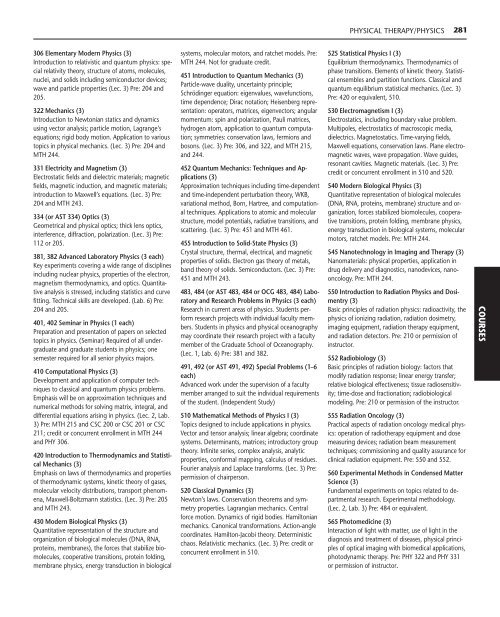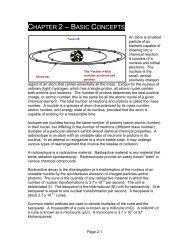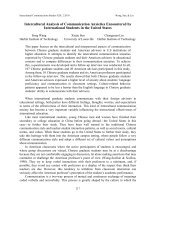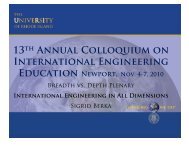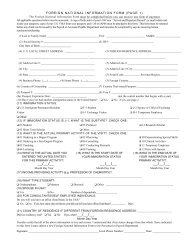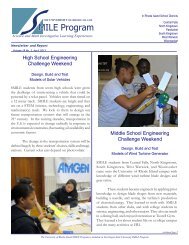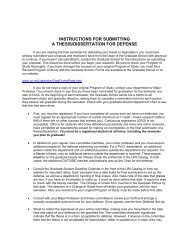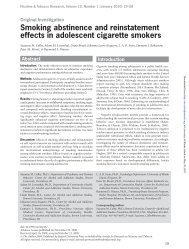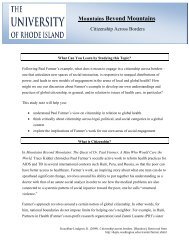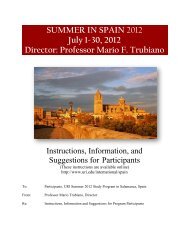UNDERGRADUATE PROGRAMS The - University of Rhode Island
UNDERGRADUATE PROGRAMS The - University of Rhode Island
UNDERGRADUATE PROGRAMS The - University of Rhode Island
You also want an ePaper? Increase the reach of your titles
YUMPU automatically turns print PDFs into web optimized ePapers that Google loves.
306 Elementary Modern Physics (3)<br />
Introduction to relativistic and quantum physics: special<br />
relativity theory, structure <strong>of</strong> atoms, molecules,<br />
nuclei, and solids including semiconductor devices;<br />
wave and particle properties (Lec. 3) Pre: 204 and<br />
205.<br />
322 Mechanics (3)<br />
Introduction to Newtonian statics and dynamics<br />
using vector analysis; particle motion, Lagrange’s<br />
equations; rigid body motion. Application to various<br />
topics in physical mechanics. (Lec. 3) Pre: 204 and<br />
MTH 244.<br />
331 Electricity and Magnetism (3)<br />
Electrostatic fields and dielectric materials; magnetic<br />
fields, magnetic induction, and magnetic materials;<br />
introduction to Maxwell’s equations. (Lec. 3) Pre:<br />
204 and MTH 243.<br />
334 (or AST 334) Optics (3)<br />
Geometrical and physical optics; thick lens optics,<br />
interference, diffraction, polarization. (Lec. 3) Pre:<br />
112 or 205.<br />
381, 382 Advanced Laboratory Physics (3 each)<br />
Key experiments covering a wide range <strong>of</strong> disciplines<br />
including nuclear physics, properties <strong>of</strong> the electron,<br />
magnetism thermodynamics, and optics. Quantitative<br />
analysis is stressed, including statistics and curve<br />
fitting. Technical skills are developed. (Lab. 6) Pre:<br />
204 and 205.<br />
401, 402 Seminar in Physics (1 each)<br />
Preparation and presentation <strong>of</strong> papers on selected<br />
topics in physics. (Seminar) Required <strong>of</strong> all undergraduate<br />
and graduate students in physics; one<br />
semester required for all senior physics majors.<br />
410 Computational Physics (3)<br />
Development and application <strong>of</strong> computer techniques<br />
to classical and quantum physics problems.<br />
Emphasis will be on approximation techniques and<br />
numerical methods for solving matrix, integral, and<br />
differential equations arising in physics. (Lec. 2, Lab.<br />
3) Pre: MTH 215 and CSC 200 or CSC 201 or CSC<br />
211; credit or concurrent enrollment in MTH 244<br />
and PHY 306.<br />
420 Introduction to <strong>The</strong>rmodynamics and Statistical<br />
Mechanics (3)<br />
Emphasis on laws <strong>of</strong> thermodynamics and properties<br />
<strong>of</strong> thermodynamic systems, kinetic theory <strong>of</strong> gases,<br />
molecular velocity distributions, transport phenomena,<br />
Maxwell-Boltzmann statistics. (Lec. 3) Pre: 205<br />
and MTH 243.<br />
430 Modern Biological Physics (3)<br />
Quantitative representation <strong>of</strong> the structure and<br />
organization <strong>of</strong> biological molecules (DNA, RNA,<br />
proteins, membranes), the forces that stabilize biomolecules,<br />
cooperative transitions, protein folding,<br />
membrane physics, energy transduction in biological<br />
systems, molecular motors, and ratchet models. Pre:<br />
MTH 244. Not for graduate credit.<br />
451 Introduction to Quantum Mechanics (3)<br />
Particle-wave duality, uncertainty principle;<br />
Schrödinger equation: eigenvalues, wavefunctions,<br />
time dependence; Dirac notation; Heisenberg representation:<br />
operators, matrices, eigenvectors; angular<br />
momentum: spin and polarization, Pauli matrices,<br />
hydrogen atom, application to quantum computation;<br />
symmetries: conservation laws, fermions and<br />
bosons. (Lec. 3) Pre: 306, and 322, and MTH 215,<br />
and 244.<br />
452 Quantum Mechanics: Techniques and Applications<br />
(3)<br />
Approximation techniques including time-dependent<br />
and time-independent perturbation theory, WKB,<br />
variational method, Born, Hartree, and computational<br />
techniques. Applications to atomic and molecular<br />
structure, model potentials, radiative transitions, and<br />
scattering. (Lec. 3) Pre: 451 and MTH 461.<br />
455 Introduction to Solid-State Physics (3)<br />
Crystal structure, thermal, electrical, and magnetic<br />
properties <strong>of</strong> solids. Electron gas theory <strong>of</strong> metals,<br />
band theory <strong>of</strong> solids. Semiconductors. (Lec. 3) Pre:<br />
451 and MTH 243.<br />
483, 484 (or AST 483, 484 or OCG 483, 484) Laboratory<br />
and Research Problems in Physics (3 each)<br />
Research in current areas <strong>of</strong> physics. Students perform<br />
research projects with individual faculty members.<br />
Students in physics and physical oceanography<br />
may coordinate their research project with a faculty<br />
member <strong>of</strong> the Graduate School <strong>of</strong> Oceanography.<br />
(Lec. 1, Lab. 6) Pre: 381 and 382.<br />
491, 492 (or AST 491, 492) Special Problems (1–6<br />
each)<br />
Advanced work under the supervision <strong>of</strong> a faculty<br />
member arranged to suit the individual requirements<br />
<strong>of</strong> the student. (Independent Study)<br />
510 Mathematical Methods <strong>of</strong> Physics I (3)<br />
Topics designed to include applications in physics.<br />
Vector and tensor analysis; linear algebra; coordinate<br />
systems. Determinants, matrices; introductory group<br />
theory. Infinite series, complex analysis, analytic<br />
properties, conformal mapping, calculus <strong>of</strong> residues.<br />
Fourier analysis and Laplace transforms. (Lec. 3) Pre:<br />
permission <strong>of</strong> chairperson.<br />
520 Classical Dynamics (3)<br />
Newton’s laws. Conservation theorems and symmetry<br />
properties. Lagrangian mechanics. Central<br />
force motion. Dynamics <strong>of</strong> rigid bodies. Hamiltonian<br />
mechanics. Canonical transformations. Action-angle<br />
coordinates. Hamilton-Jacobi theory. Deterministic<br />
chaos. Relativistic mechanics. (Lec. 3) Pre: credit or<br />
concurrent enrollment in 510.<br />
PHYSICAL THERAPY/PHYSICS<br />
281<br />
525 Statistical Physics I (3)<br />
Equilibrium thermodynamics. <strong>The</strong>rmodynamics <strong>of</strong><br />
phase transitions. Elements <strong>of</strong> kinetic theory. Statistical<br />
ensembles and partition functions. Classical and<br />
quantum equilibrium statistical mechanics. (Lec. 3)<br />
Pre: 420 or equivalent, 510.<br />
530 Electromagnetism I (3)<br />
Electrostatics, including boundary value problem.<br />
Multipoles, electrostatics <strong>of</strong> macroscopic media,<br />
dielectrics. Magnetostatics. Time-varying fields,<br />
Maxwell equations, conservation laws. Plane electromagnetic<br />
waves, wave propagation. Wave guides,<br />
resonant cavities. Magnetic materials. (Lec. 3) Pre:<br />
credit or concurrent enrollment in 510 and 520.<br />
540 Modern Biological Physics (3)<br />
Quantitative representation <strong>of</strong> biological molecules<br />
(DNA, RNA, proteins, membrane) structure and organization,<br />
forces stabilized biomolecules, cooperative<br />
transitions, protein folding, membrane physics,<br />
energy transduction in biological systems, molecular<br />
motors, ratchet models. Pre: MTH 244.<br />
545 Nanotechnology in Imaging and <strong>The</strong>rapy (3)<br />
Nanomaterials: physical properties, application in<br />
drug delivery and diagnostics, nanodevices, nanooncology.<br />
Pre: MTH 244.<br />
550 Introduction to Radiation Physics and Dosimentry<br />
(3)<br />
Basic principles <strong>of</strong> radiation physics: radioactivity, the<br />
physics <strong>of</strong> ionizing radiation, radiation dosimetry,<br />
imaging equipment, radiation therapy equipment,<br />
and radiation detectors. Pre: 210 or permission <strong>of</strong><br />
instructor.<br />
552 Radiobiology (3)<br />
Basic principles <strong>of</strong> radiation biology: factors that<br />
modify radiation response; linear energy transfer;<br />
relative biological effectiveness; tissue radiosensitivity;<br />
time-dose and fractionation; radiobiological<br />
modeling. Pre: 210 or permission <strong>of</strong> the instructor.<br />
555 Radiation Oncology (3)<br />
Practical aspects <strong>of</strong> radiation oncology medical physics:<br />
operation <strong>of</strong> radiotherapy equipment and dose<br />
measuring devices; radiation beam measurement<br />
techniques; commissioning and quality assurance for<br />
clinical radiation equipment. Pre: 550 and 552.<br />
560 Experimental Methods in Condensed Matter<br />
Science (3)<br />
Fundamental experiments on topics related to departmental<br />
research. Experimental methodology.<br />
(Lec. 2, Lab. 3) Pre: 484 or equivalent.<br />
565 Photomedicine (3)<br />
Interaction <strong>of</strong> light with matter, use <strong>of</strong> light in the<br />
diagnosis and treatment <strong>of</strong> diseases, physical principles<br />
<strong>of</strong> optical imaging with biomedical applications,<br />
photodynamic therapy. Pre: PHY 322 and PHY 331<br />
or permission <strong>of</strong> instructor.<br />
COURSES


